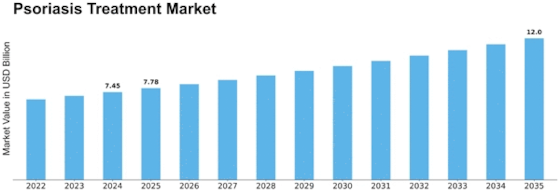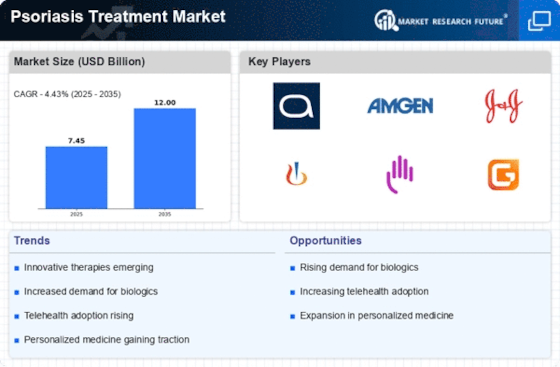Topical Treatments
Systemic Treatments
Phototherapy
Biologics
Oral
Topical
Injectable
Intravenous
Plaque Psoriasis
Guttate Psoriasis
Inverse Psoriasis
Pustular Psoriasis
Hospital
Dermatology Clinics
Homecare Settings
North America
Europe
South America
Asia Pacific
Middle East and Africa
North America Outlook (USD Billion, 2019-2035)
Psoriasis Treatment Market by Treatment Type
Topical Treatments
Systemic Treatments
Phototherapy
Biologics
Psoriasis Treatment Market by Administration Route Type
Oral
Topical
Injectable
Intravenous
Psoriasis Treatment Market by Indication Type
Plaque Psoriasis
Guttate Psoriasis
Inverse Psoriasis
Pustular Psoriasis
Psoriasis Treatment Market by End User Type
Hospital
Dermatology Clinics
Homecare Settings
Psoriasis Treatment Market by Regional Type
US
Canada
US Outlook (USD Billion, 2019-2035)
Psoriasis Treatment Market by Treatment Type
Topical Treatments
Systemic Treatments
Phototherapy
Biologics
Psoriasis Treatment Market by Administration Route Type
Oral
Topical
Injectable
Intravenous
Psoriasis Treatment Market by Indication Type
Plaque Psoriasis
Guttate Psoriasis
Inverse Psoriasis
Pustular Psoriasis
Psoriasis Treatment Market by End User Type
Hospital
Dermatology Clinics
Homecare Settings
CANADA Outlook (USD Billion, 2019-2035)
Psoriasis Treatment Market by Treatment Type
Topical Treatments
Systemic Treatments
Phototherapy
Biologics
Psoriasis Treatment Market by Administration Route Type
Oral
Topical
Injectable
Intravenous
Psoriasis Treatment Market by Indication Type
Plaque Psoriasis
Guttate Psoriasis
Inverse Psoriasis
Pustular Psoriasis
Psoriasis Treatment Market by End User Type
Hospital
Dermatology Clinics
Homecare Settings
Europe Outlook (USD Billion, 2019-2035)
Psoriasis Treatment Market by Treatment Type
Topical Treatments
Systemic Treatments
Phototherapy
Biologics
Psoriasis Treatment Market by Administration Route Type
Oral
Topical
Injectable
Intravenous
Psoriasis Treatment Market by Indication Type
Plaque Psoriasis
Guttate Psoriasis
Inverse Psoriasis
Pustular Psoriasis
Psoriasis Treatment Market by End User Type
Hospital
Dermatology Clinics
Homecare Settings
Psoriasis Treatment Market by Regional Type
Germany
UK
France
Russia
Italy
Spain
Rest of Europe
GERMANY Outlook (USD Billion, 2019-2035)
Psoriasis Treatment Market by Treatment Type
Topical Treatments
Systemic Treatments
Phototherapy
Biologics
Psoriasis Treatment Market by Administration Route Type
Oral
Topical
Injectable
Intravenous
Psoriasis Treatment Market by Indication Type
Plaque Psoriasis
Guttate Psoriasis
Inverse Psoriasis
Pustular Psoriasis
Psoriasis Treatment Market by End User Type
Hospital
Dermatology Clinics
Homecare Settings
UK Outlook (USD Billion, 2019-2035)
Psoriasis Treatment Market by Treatment Type
Topical Treatments
Systemic Treatments
Phototherapy
Biologics
Psoriasis Treatment Market by Administration Route Type
Oral
Topical
Injectable
Intravenous
Psoriasis Treatment Market by Indication Type
Plaque Psoriasis
Guttate Psoriasis
Inverse Psoriasis
Pustular Psoriasis
Psoriasis Treatment Market by End User Type
Hospital
Dermatology Clinics
Homecare Settings
FRANCE Outlook (USD Billion, 2019-2035)
Psoriasis Treatment Market by Treatment Type
Topical Treatments
Systemic Treatments
Phototherapy
Biologics
Psoriasis Treatment Market by Administration Route Type
Oral
Topical
Injectable
Intravenous
Psoriasis Treatment Market by Indication Type
Plaque Psoriasis
Guttate Psoriasis
Inverse Psoriasis
Pustular Psoriasis
Psoriasis Treatment Market by End User Type
Hospital
Dermatology Clinics
Homecare Settings
RUSSIA Outlook (USD Billion, 2019-2035)
Psoriasis Treatment Market by Treatment Type
Topical Treatments
Systemic Treatments
Phototherapy
Biologics
Psoriasis Treatment Market by Administration Route Type
Oral
Topical
Injectable
Intravenous
Psoriasis Treatment Market by Indication Type
Plaque Psoriasis
Guttate Psoriasis
Inverse Psoriasis
Pustular Psoriasis
Psoriasis Treatment Market by End User Type
Hospital
Dermatology Clinics
Homecare Settings
ITALY Outlook (USD Billion, 2019-2035)
Psoriasis Treatment Market by Treatment Type
Topical Treatments
Systemic Treatments
Phototherapy
Biologics
Psoriasis Treatment Market by Administration Route Type
Oral
Topical
Injectable
Intravenous
Psoriasis Treatment Market by Indication Type
Plaque Psoriasis
Guttate Psoriasis
Inverse Psoriasis
Pustular Psoriasis
Psoriasis Treatment Market by End User Type
Hospital
Dermatology Clinics
Homecare Settings
SPAIN Outlook (USD Billion, 2019-2035)
Psoriasis Treatment Market by Treatment Type
Topical Treatments
Systemic Treatments
Phototherapy
Biologics
Psoriasis Treatment Market by Administration Route Type
Oral
Topical
Injectable
Intravenous
Psoriasis Treatment Market by Indication Type
Plaque Psoriasis
Guttate Psoriasis
Inverse Psoriasis
Pustular Psoriasis
Psoriasis Treatment Market by End User Type
Hospital
Dermatology Clinics
Homecare Settings
REST OF EUROPE Outlook (USD Billion, 2019-2035)
Psoriasis Treatment Market by Treatment Type
Topical Treatments
Systemic Treatments
Phototherapy
Biologics
Psoriasis Treatment Market by Administration Route Type
Oral
Topical
Injectable
Intravenous
Psoriasis Treatment Market by Indication Type
Plaque Psoriasis
Guttate Psoriasis
Inverse Psoriasis
Pustular Psoriasis
Psoriasis Treatment Market by End User Type
Hospital
Dermatology Clinics
Homecare Settings
APAC Outlook (USD Billion, 2019-2035)
Psoriasis Treatment Market by Treatment Type
Topical Treatments
Systemic Treatments
Phototherapy
Biologics
Psoriasis Treatment Market by Administration Route Type
Oral
Topical
Injectable
Intravenous
Psoriasis Treatment Market by Indication Type
Plaque Psoriasis
Guttate Psoriasis
Inverse Psoriasis
Pustular Psoriasis
Psoriasis Treatment Market by End User Type
Hospital
Dermatology Clinics
Homecare Settings
Psoriasis Treatment Market by Regional Type
China
India
Japan
South Korea
Malaysia
Thailand
Indonesia
Rest of APAC
CHINA Outlook (USD Billion, 2019-2035)
Psoriasis Treatment Market by Treatment Type
Topical Treatments
Systemic Treatments
Phototherapy
Biologics
Psoriasis Treatment Market by Administration Route Type
Oral
Topical
Injectable
Intravenous
Psoriasis Treatment Market by Indication Type
Plaque Psoriasis
Guttate Psoriasis
Inverse Psoriasis
Pustular Psoriasis
Psoriasis Treatment Market by End User Type
Hospital
Dermatology Clinics
Homecare Settings
INDIA Outlook (USD Billion, 2019-2035)
Psoriasis Treatment Market by Treatment Type
Topical Treatments
Systemic Treatments
Phototherapy
Biologics
Psoriasis Treatment Market by Administration Route Type
Oral
Topical
Injectable
Intravenous
Psoriasis Treatment Market by Indication Type
Plaque Psoriasis
Guttate Psoriasis
Inverse Psoriasis
Pustular Psoriasis
Psoriasis Treatment Market by End User Type
Hospital
Dermatology Clinics
Homecare Settings
JAPAN Outlook (USD Billion, 2019-2035)
Psoriasis Treatment Market by Treatment Type
Topical Treatments
Systemic Treatments
Phototherapy
Biologics
Psoriasis Treatment Market by Administration Route Type
Oral
Topical
Injectable
Intravenous
Psoriasis Treatment Market by Indication Type
Plaque Psoriasis
Guttate Psoriasis
Inverse Psoriasis
Pustular Psoriasis
Psoriasis Treatment Market by End User Type
Hospital
Dermatology Clinics
Homecare Settings
SOUTH KOREA Outlook (USD Billion, 2019-2035)
Psoriasis Treatment Market by Treatment Type
Topical Treatments
Systemic Treatments
Phototherapy
Biologics
Psoriasis Treatment Market by Administration Route Type
Oral
Topical
Injectable
Intravenous
Psoriasis Treatment Market by Indication Type
Plaque Psoriasis
Guttate Psoriasis
Inverse Psoriasis
Pustular Psoriasis
Psoriasis Treatment Market by End User Type
Hospital
Dermatology Clinics
Homecare Settings
MALAYSIA Outlook (USD Billion, 2019-2035)
Psoriasis Treatment Market by Treatment Type
Topical Treatments
Systemic Treatments
Phototherapy
Biologics
Psoriasis Treatment Market by Administration Route Type
Oral
Topical
Injectable
Intravenous
Psoriasis Treatment Market by Indication Type
Plaque Psoriasis
Guttate Psoriasis
Inverse Psoriasis
Pustular Psoriasis
Psoriasis Treatment Market by End User Type
Hospital
Dermatology Clinics
Homecare Settings
THAILAND Outlook (USD Billion, 2019-2035)
Psoriasis Treatment Market by Treatment Type
Topical Treatments
Systemic Treatments
Phototherapy
Biologics
Psoriasis Treatment Market by Administration Route Type
Oral
Topical
Injectable
Intravenous
Psoriasis Treatment Market by Indication Type
Plaque Psoriasis
Guttate Psoriasis
Inverse Psoriasis
Pustular Psoriasis
Psoriasis Treatment Market by End User Type
Hospital
Dermatology Clinics
Homecare Settings
INDONESIA Outlook (USD Billion, 2019-2035)
Psoriasis Treatment Market by Treatment Type
Topical Treatments
Systemic Treatments
Phototherapy
Biologics
Psoriasis Treatment Market by Administration Route Type
Oral
Topical
Injectable
Intravenous
Psoriasis Treatment Market by Indication Type
Plaque Psoriasis
Guttate Psoriasis
Inverse Psoriasis
Pustular Psoriasis
Psoriasis Treatment Market by End User Type
Hospital
Dermatology Clinics
Homecare Settings
REST OF APAC Outlook (USD Billion, 2019-2035)
Psoriasis Treatment Market by Treatment Type
Topical Treatments
Systemic Treatments
Phototherapy
Biologics
Psoriasis Treatment Market by Administration Route Type
Oral
Topical
Injectable
Intravenous
Psoriasis Treatment Market by Indication Type
Plaque Psoriasis
Guttate Psoriasis
Inverse Psoriasis
Pustular Psoriasis
Psoriasis Treatment Market by End User Type
Hospital
Dermatology Clinics
Homecare Settings
South America Outlook (USD Billion, 2019-2035)
Psoriasis Treatment Market by Treatment Type
Topical Treatments
Systemic Treatments
Phototherapy
Biologics
Psoriasis Treatment Market by Administration Route Type
Oral
Topical
Injectable
Intravenous
Psoriasis Treatment Market by Indication Type
Plaque Psoriasis
Guttate Psoriasis
Inverse Psoriasis
Pustular Psoriasis
Psoriasis Treatment Market by End User Type
Hospital
Dermatology Clinics
Homecare Settings
Psoriasis Treatment Market by Regional Type
Brazil
Mexico
Argentina
Rest of South America
BRAZIL Outlook (USD Billion, 2019-2035)
Psoriasis Treatment Market by Treatment Type
Topical Treatments
Systemic Treatments
Phototherapy
Biologics
Psoriasis Treatment Market by Administration Route Type
Oral
Topical
Injectable
Intravenous
Psoriasis Treatment Market by Indication Type
Plaque Psoriasis
Guttate Psoriasis
Inverse Psoriasis
Pustular Psoriasis
Psoriasis Treatment Market by End User Type
Hospital
Dermatology Clinics
Homecare Settings
MEXICO Outlook (USD Billion, 2019-2035)
Psoriasis Treatment Market by Treatment Type
Topical Treatments
Systemic Treatments
Phototherapy
Biologics
Psoriasis Treatment Market by Administration Route Type
Oral
Topical
Injectable
Intravenous
Psoriasis Treatment Market by Indication Type
Plaque Psoriasis
Guttate Psoriasis
Inverse Psoriasis
Pustular Psoriasis
Psoriasis Treatment Market by End User Type
Hospital
Dermatology Clinics
Homecare Settings
ARGENTINA Outlook (USD Billion, 2019-2035)
Psoriasis Treatment Market by Treatment Type
Topical Treatments
Systemic Treatments
Phototherapy
Biologics
Psoriasis Treatment Market by Administration Route Type
Oral
Topical
Injectable
Intravenous
Psoriasis Treatment Market by Indication Type
Plaque Psoriasis
Guttate Psoriasis
Inverse Psoriasis
Pustular Psoriasis
Psoriasis Treatment Market by End User Type
Hospital
Dermatology Clinics
Homecare Settings
REST OF SOUTH AMERICA Outlook (USD Billion, 2019-2035)
Psoriasis Treatment Market by Treatment Type
Topical Treatments
Systemic Treatments
Phototherapy
Biologics
Psoriasis Treatment Market by Administration Route Type
Oral
Topical
Injectable
Intravenous
Psoriasis Treatment Market by Indication Type
Plaque Psoriasis
Guttate Psoriasis
Inverse Psoriasis
Pustular Psoriasis
Psoriasis Treatment Market by End User Type
Hospital
Dermatology Clinics
Homecare Settings
MEA Outlook (USD Billion, 2019-2035)
Psoriasis Treatment Market by Treatment Type
Topical Treatments
Systemic Treatments
Phototherapy
Biologics
Psoriasis Treatment Market by Administration Route Type
Oral
Topical
Injectable
Intravenous
Psoriasis Treatment Market by Indication Type
Plaque Psoriasis
Guttate Psoriasis
Inverse Psoriasis
Pustular Psoriasis
Psoriasis Treatment Market by End User Type
Hospital
Dermatology Clinics
Homecare Settings
Psoriasis Treatment Market by Regional Type
GCC Countries
South Africa
Rest of MEA
GCC COUNTRIES Outlook (USD Billion, 2019-2035)
Psoriasis Treatment Market by Treatment Type
Topical Treatments
Systemic Treatments
Phototherapy
Biologics
Psoriasis Treatment Market by Administration Route Type
Oral
Topical
Injectable
Intravenous
Psoriasis Treatment Market by Indication Type
Plaque Psoriasis
Guttate Psoriasis
Inverse Psoriasis
Pustular Psoriasis
Psoriasis Treatment Market by End User Type
Hospital
Dermatology Clinics
Homecare Settings
SOUTH AFRICA Outlook (USD Billion, 2019-2035)
Psoriasis Treatment Market by Treatment Type
Topical Treatments
Systemic Treatments
Phototherapy
Biologics
Psoriasis Treatment Market by Administration Route Type
Oral
Topical
Injectable
Intravenous
Psoriasis Treatment Market by Indication Type
Plaque Psoriasis
Guttate Psoriasis
Inverse Psoriasis
Pustular Psoriasis
Psoriasis Treatment Market by End User Type
Hospital
Dermatology Clinics
Homecare Settings
REST OF MEA Outlook (USD Billion, 2019-2035)
Psoriasis Treatment Market by Treatment Type
Topical Treatments
Systemic Treatments
Phototherapy
Biologics
Psoriasis Treatment Market by Administration Route Type
Oral
Topical
Injectable
Intravenous
Psoriasis Treatment Market by Indication Type
Plaque Psoriasis
Guttate Psoriasis
Inverse Psoriasis
Pustular Psoriasis
Psoriasis Treatment Market by End User Type
Hospital
Dermatology Clinics
Homecare Settings




















Leave a Comment